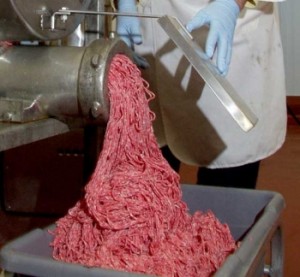Four years after the death of 23 Canadians in the Maple Leaf listeria-in-cold-cuts outbreak — hampered by a bungled and delayed federal investigation — the same death-by-a-thousand cold cuts Agriculture Minister is in charge and the same  mistakes are being made as E. coli O157 riddles beef from Edmonton-based XL Foods.
mistakes are being made as E. coli O157 riddles beef from Edmonton-based XL Foods.
As a Canadian colleague wrote me, Mr. Ag Minister doesn’t have clue.
The Edmonton Journal correctly asks, how is it that almost two weeks went by from the time the Canadian Food Inspection Agency was first notified by U.S. officials that E. coli bacteria were discovered in beef trimmings at the U.S. border and the time that the first health alert was issued? How to explain the three-day lag between the remarkable klaxon-bell decision by the U.S. Department of Agriculture to ban meat shipments from XL Foods’s Lakeside plant in Brooks and the first of a still-expanding series of product recalls here in Canada?
How is it that 46 government inspectors stationed at the Brooks plant, Canada’s second-largest slaughter facility, failed to flag problems that only came to light when a shipment of meat intercepted at the border by U.S. inspectors in Sweetgrass, Mont., yielded a positive test result for E. coli?
Paula Simmons of the Edmonton Journal got it right when she identified the lack of leadership in the entire debacle. And that goes to the top.
But this has all happened before. On Aug. 23, 2008, Maple Leaf CEO Michael McCain took to the Intertubes to apologize for an expanding outbreak of listeriosis that would eventually kill 23. As part of his speech, McCain said that Maple Leaf has “a strong culture of food safety.”
On Aug. 27, 2008, McCain told a press conference, “As I’ve said before, Maple Leaf Foods is 23,000 people who live in a culture of food safety. We have an unwavering commitment to keep our food safe, and we have excellent systems and processes in place.”
As laid bare in the Weatherill report on the 2008 listeria shit-fest, McCain’s invocation of food safety culture was as credible as the politicians and bureaucrats who lauded the workings of Canada’s food safety surveillance system, when it didn’t actually work at all.
Andre Picard, the long-time health reporter for Toronto’s Globe and Mail, picked up on this theme when he wrote, “the root of the listeriosis outbreak in Canada in 2008  was not two dirty meat slicers but rather a culture – in government and private enterprise alike – in which food safety was not a priority but an afterthought.”
was not two dirty meat slicers but rather a culture – in government and private enterprise alike – in which food safety was not a priority but an afterthought.”
Picard says Ms. Weatherill’s most important recommendation – one that has been largely glossed over in media coverage of the report – is for a culture of safety or, as is stated bluntly in the report: “Actions, not words.”
But words are big in Alberta these days. Premier Alison Redford vowed on the weekend that Alberta beef is safe, despite E. coli. Others noted cattle ranchers will suffer if XL Foods, which processes almost a third of Canada’s overall beef production isn’t reopened soon.
“We have, in this province, excellent beef,” Redford said at a ranch west of Airdrie. “We stand behind our producers and we stand behind the product they produce.”
Consumers were also told by the absolutely awful Canadian Partnership for Consumer Food Safety Education that, “we all have a role to play in ensuring our homes are food-safe” while CanadaBeef Inc. decided it was an opportune time to say, “Canada has an excellent track record in food safety. Canadian meat processors have developed internationally recognized systems known as HACCP (Hazard Analysis and Critical Control Point) plans to control E. coli O157:H7 and other foodborne bacteria.”
With nine people believed to be sick from the beef, including a 5-year-old Edmonton boy whose mother said, “At five in the morning, he was screaming in pain. ‘I have a stomach ache, I have a stomach ache.’ I had a pull-up [diaper] on him, and it was full of blood,” coulds these groups be any more condescending?
The best food producers, processors, retailers and restaurants will go above and beyond minimal government and auditor standards and sell food safety solutions directly to the public. The best organizations will use their own people to demand ingredients from the best suppliers; use a mixture of encouragement and enforcement to foster a food safety culture; and use technology to be transparent — whether it’s live webcams in the facility or real-time test results on the website — to help restore the shattered trust with the buying public.










 Alberta (that’s in Canada) has been diagnosed with hepatitis A.
Alberta (that’s in Canada) has been diagnosed with hepatitis A.